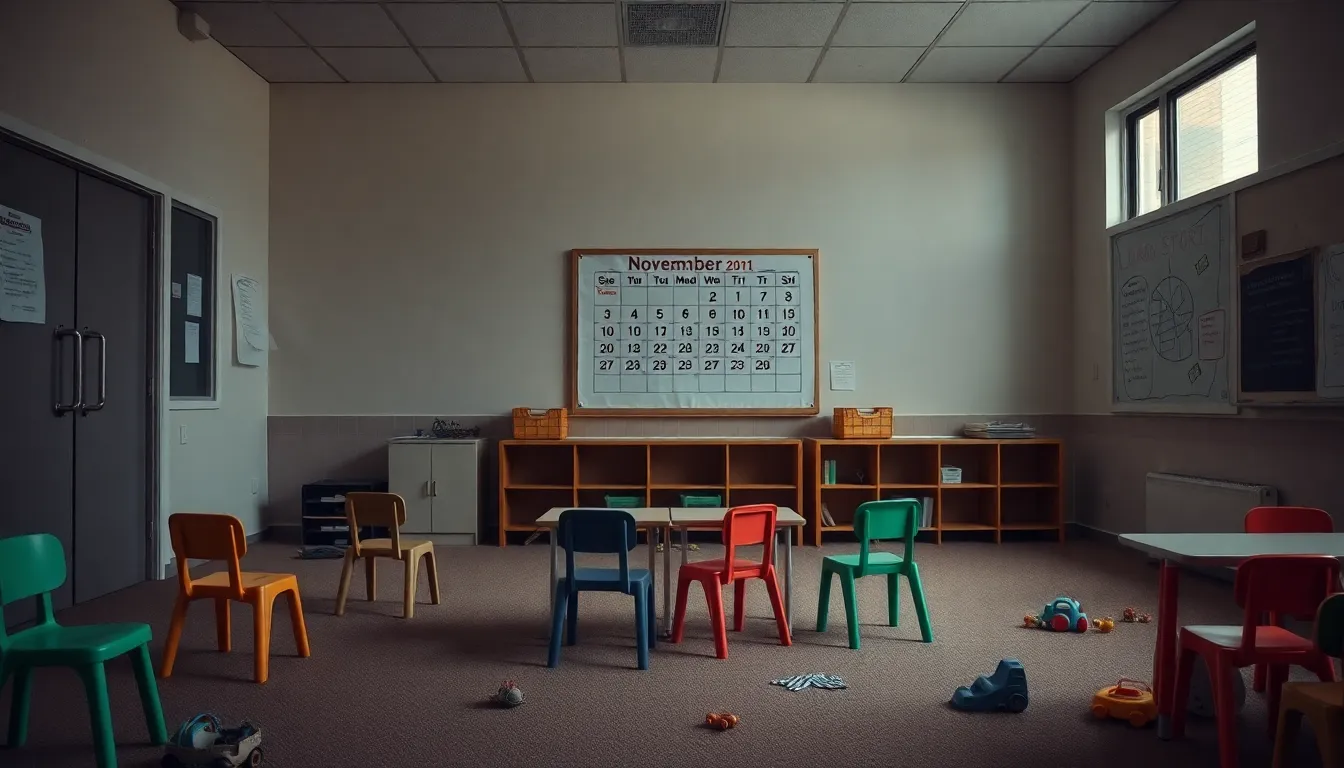The looming federal shutdown threatens to disrupt childcare, jobs for thousands of Kansas City families, directly jeopardizing vital early childhood education services for 2,300 children starting November 1. This administrative gridlock will force the closure of 17 Head Start sites in the Kansas City area, creating an immediate work-childcare dilemma for affected parents and impacting 400 educators.
Key Implications
- Childcare Access and Family Stability: Thousands of Kansas City families, particularly 2,300 relying on Head Start, will face an immediate childcare void, forcing parents to choose between maintaining employment and securing essential care and education for their children.
- Workforce Disruption and Economic Strain: The closures will result in job uncertainty for 400 early childhood educators and destabilize the regional workforce as parents reduce hours or leave jobs due to lacking childcare, affecting household incomes and local business operations.
- Long-Term Educational and Community Development: Disruptions to Head Start programs can lead to long-term educational setbacks for young children, undermining school readiness and weakening overall community development efforts in the Kansas City region.

2,300 Children’s Education Halted by November 1 Head Start Closures
The looming federal government shutdown poses a severe threat to vital early childhood education services in the Kansas City region. Seventeen Head Start sites are scheduled for closure on November 1, directly impacting thousands of local families. This drastic measure highlights how a federal shutdown threatens to disrupt childcare, jobs for thousands of Kansas City families, creating immediate and widespread instability.
The Imminent Threat to Early Childhood Education
The impending closures will affect 17 Head Start sites located across the Kansas City area. These critical facilities serve communities in Clay, Platte, and Jackson counties, providing essential educational and developmental support to young children. Head Start programs are cornerstones for low-income families, offering comprehensive services beyond basic education.
The projected closure date of November 1 is firm unless the federal government reopens and funding is restored. This date immediately follows October 31, which marks the end of the Mid-American Regional Council (MARC)’s current grant year for Head Start services. The timing creates an abrupt halt, leaving little room for alternative planning.
Mid-American Regional Council (MARC) is the entity responsible for administering these Head Start services locally. The current disruption stems from MARC not receiving the Notice of Award for the upcoming grant cycle. This crucial administrative step, typically a formality, is now stalled due to the federal impasse, directly triggering the site closures.
Quantifiable Impact on Families and Workforce
The most immediate and heartbreaking impact will fall upon 2,300 children and their families served by the affected Head Start sites. These families rely on Head Start for high-quality, free early learning environments, nutritional support, and health services. The abrupt cessation of these programs creates an enormous childcare void. Parents will struggle to find suitable and affordable alternatives on such short notice. This situation exacerbates existing pressures on families already grappling with limited resources, making it harder for parents to maintain employment. Many families facing these challenges often find themselves with few viable child care options when federal support falters.
Furthermore, 400 early childhood educators are directly impacted by these imminent site closures. These dedicated professionals face job uncertainty, potential layoffs, and significant financial strain. Losing experienced educators not only harms individual livelihoods but also weakens the overall early childhood education infrastructure in the Kansas City area. The departure of these skilled individuals could have lasting repercussions on the availability and quality of future childcare services.
The disruption extends beyond individual families and educators to the broader economic stability of the region. Without reliable childcare, parents may be forced to reduce work hours or leave their jobs entirely. This directly contributes to the overarching concern that a federal shutdown threatens to disrupt childcare, jobs for thousands of Kansas City families, affecting household incomes and local business operations. The stability provided by programs like Head Start is integral to maintaining a productive workforce.
The Broader Economic and Community Fallout
The closure of Head Start sites represents more than just a loss of individual services; it signifies a significant setback for community development in the Kansas City region. These programs are vital for school readiness, offering foundational learning that helps bridge achievement gaps. An interruption could have long-term educational and social consequences for vulnerable children. Communities thrive when their youngest members receive strong support, as seen through successful child care awareness initiatives that highlight the positive effects of early education.
The situation underscores the fragility of local services dependent on federal funding mechanisms. The lack of a simple Notice of Award, typically an administrative formality, reveals how national political gridlock can immediately cripple essential community programs. This dependency leaves thousands of families and hundreds of educators vulnerable to decisions made far from their communities. Exploring how manufacturing companies are helping employees with child care illustrates the growing need for diverse, stable solutions.
The Mid-American Regional Council’s inability to secure the next grant cycle due to the shutdown means critical operational funding is withheld. This impasse prevents salaries, facility maintenance, and educational resources from being secured, forcing the regrettable decision to close the sites. The impact is immediate, quantifiable, and deeply personal for thousands of Kansas City residents. Urgent resolution of the federal shutdown is paramount to prevent these profound disruptions to early childhood education and local employment.

November 1 Funding Gap Forces Work-Childcare Dilemma for 2,300 Families
The impending federal shutdown threatens to disrupt childcare, jobs for thousands of Kansas City families, creating an immediate crisis for vital community services. Specifically, the Mid-American Regional Council (MARC), a cornerstone for early childhood education, faces an untenable situation. Without official federal funding notification, MARC is unable to incur any expenses for Head Start services past October 31. This administrative paralysis directly jeopardizes foundational support for families across the region.
This critical funding gap leads to widespread operational paralysis. It directly impacts 2,300 families who rely on these essential programs. Starting November 1, many parents will be forced to make an impossible choice. They must decide between maintaining their employment or ensuring their children receive crucial care and early education. The absence of a Notice of Award for the upcoming grant cycle due to the shutdown prevents any continuity in services.
Administrative Gridlock: A Stalled Lifeline for Head Start
The core of the issue lies in a severe administrative gridlock caused by the ongoing federal shutdown. MARC’s current grant year for Head Start services concludes on October 31. The new grant cycle is slated to commence on November 1. However, without a formal Notice of Award for the upcoming cycle, MARC finds itself in an impossible position. This crucial notification is typically processed well in advance. Yet, the federal government’s operational standstill has halted its issuance.
Consequently, after October 31, MARC cannot incur any expenses for Head Start services without certainty of reimbursement. This isn’t merely a delay; it’s a complete cessation of operational funding and reimbursement certainty. Such a situation creates an unsustainable environment for providing essential early childhood development programs. These programs inherently require continuous financial backing for staff, facilities, and resources.
This specific challenge highlights how the federal shutdown threatens to disrupt childcare, jobs for thousands of Kansas City families by severing the financial lifelines of community organizations. Organizations like MARC meticulously plan their budgets and services months in advance. Now, they are left without the basic authorization to proceed. The direct impact is an immediate halt to services, despite the clear and pressing community need.
The Ripple Effect: A Dire Work-Childcare Dilemma
The immediate consequence of this funding paralysis falls squarely on the shoulders of working parents. A staggering 2,300 families will be forced to choose between work and childcare due to service disruptions. For many, Head Start isn’t just a convenience. It’s the bedrock of their ability to maintain employment, providing a safe, educational environment for their children while they contribute to the economy.
Centers like EarlyStart KC are identified as one of the centers facing potential closure due to the loss of critical federal support. These centers provide more than just supervision. They offer comprehensive services including early learning opportunities, health screenings, and nutritional support for low-income children. The closure or suspension of these services means an immediate void in care options, especially for vulnerable populations.
For parents, the choice is stark. They must either find immediate, often expensive, alternative childcare – which may not even be available – or risk their employment. This dual impact on both foundational education and economic stability illustrates the profound and immediate harm caused by the administrative breakdown. For some, finding alternative care is further complicated by child care voucher cuts and increased costs, making the situation even more dire. It underscores how the federal shutdown threatens to disrupt childcare, jobs for thousands of Kansas City families in a very real and personal way.
Beyond the Immediate: Long-Term Societal Implications
While the immediate impact is devastating, the long-term societal implications of this funding gap are equally concerning. The disruption of foundational education for thousands of young children can have lasting effects on their development and future academic success. Head Start programs are designed to mitigate achievement gaps before they begin, offering crucial early intervention.
Furthermore, the economic stability of the entire Kansas City metropolitan area is subtly undermined. When 2,300 families are forced to choose between work and childcare, it creates instability in the workforce. This can potentially lead to lost wages, reduced productivity, and increased reliance on social safety nets. This scenario strains local businesses and the broader community infrastructure, even as some manufacturing companies are helping employees with child care.
The situation serves as a stark reminder of the interconnectedness of federal policy, local services, and individual family well-being. Ensuring the continuity of programs like Head Start is not merely an act of charity; it is an investment in the future workforce and the educational pipeline of the community. Community efforts and awareness are crucial in advocating for these vital resources. The swift resolution of the federal funding impasse is critical not just for MARC and its families, but for the sustained health of the Kansas City region.
Featured image generated using Flux AI
KCTV: “Federal shutdown threatens to disrupt childcare, jobs for thousands of Kansas City families”
